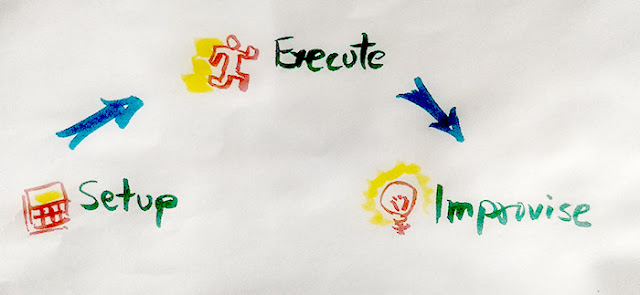Lately I have been experimenting a lot with changing my daily patterns. Like many others, I have also become a victim of wasteful habits. Be it watching TV or spending a lot of time on the smartphone or leaving things half way through (even that can be called a habit frankly) or just not focusing on anything particular.
I gave it a lot of thought and realized that it would make a lot of sense to focus on small things and then extrapolate it to bigger goals or intents. This way I would not get overwhelmed with tasks or disheartened with failures. Small successes and failures are manageable.
I remember the first habit I tried to build. Read a book. So many times have I left books half way through. The fact that I read a lot of non-fiction, business and scientific books, mean that there is no need to finish any book. In fact you can also start mid way if you choose to. Anyways, that was not the intent. Completing the book meant learning something the way the author intended you to understand or read.
You may want to learn a new skill or perhaps learn to cook or practice and improve your musical instrument skill. But there are so many times you might say to your self "from today I will practise playing my guitar daily. And then in a matter of few days, something comes up and you miss out on one of your practice. You procrastinate or get demotivated and think to your self "I am pathetic" , or worst, your mind locks out the very thought, never to bring it up till the next time (weeks or perhaps months later). So, what does one do?
Here is my technique, that might help ....
Step 1 : The Setup
Step 2 : Execute Habit
Step 3: Improvise
Step 1 : The Setup
Fix a time of the day to action the habit. Add a reminder on your smartphone (daily reminder) to alert you to action your habit. Some habits cannot be done on specific time of the day. In that case, identify cue's that trigger the action. Let's way you are watch or listen to tutorials on the go when travelling to or from work. In that case, your cue is commuting. Or perhaps a team break or lunch break or morning walk etc. When this even occurs, you get the cue that you need to initiate your habit task.
Keep a diary or a wall calendar to tick dates on which the tasks were executed. Calendars are better as they hang on the wall and are always there in front of you. additionally tell a friend of family member about your intended habit and request them to remind you (occasionally) just as a back up.
Step 2 : Execute Habit
So what is it that you are planning on doing? If its something simple like taking your morning pills (medicines), then its just mere execution of task. But if your habit involves something that takes long time and bigger effort then you need some basic planning (example - reading a book or studying a subject or learning to cook etc). Here is what it really boils down to ...
Break down activity into small chunks. Meaning short duration and simpler tasks. Which means, in case you plan to read a book then read for half an hour or one chapter a day. Small chunks are easily digestible and less annoying or difficult. If you are learning a subject, plan the chapters and concept to be learned on a calendar or paper and tick them off as you cover them.
When you complete a task, you can reward yourself. Do it initially and not always. Use rewards only when the habit bring attempted have a degree of difficulty or pain associated with it. Like say you plan on getting in shape by hitting the gym. After a gym routine, your body might get tired or experience muscle pain. You may choose to reward yourself with a week end massage to relax your muscles. By the way, who doesn't enjoy a good massage.
Step 3 : Improvise
Remember, if you need motivation, your habit has not yet been formed. A habit comes naturally, or as they say, its second nature.
I remember when I decided that I wanted to learn painting. The biggest hurdle was not that I couldn't paint well. In fact getting myself to sit down with paper and colors was the biggest challenge. Once you kick off painting habitually on a regular basis, then the next step of evolution, that is to improve your skills, kicks in.
This is a transitional phase that you will experience. You will naturally want to spend more time on the habit or perhaps increase the difficulty level. Keep reviewing your activity on a weekly basis.
If you are skipping activities, you might want to reset some motivation and reward for your routine. Review them to check if they end up helping you achieve goal or not. Keep improvising.
Remember, not being able to form a habit is ok. You can always attempt it again, and again ... True failure is not attempting at all.

No comments:
Post a Comment